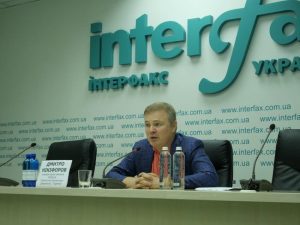
Creditwest Bank (Kyiv) unreasonably blocks the property that is pledged by it on the repaid loan, the owner of the group of companies Voda UA, Karpatska Dzherelna Vysokohirna, Horianka, Dmytro Nikiforov, has said.
“After all obligations under the loan agreement have been fulfilled, the bank continues to hold the property in pledge, conducts incomprehensible correspondence and constantly asks us to provide certain documents regarding financial reporting, our turnover in other banks,” he said at a press conference at the Interfax-Ukraine agency.
“They made it very clear to us … that they are not going to release pledge from our property,” Nikiforov added.
According to him, the obligations of his companies on the loan to Creditwest Bank were fulfilled on October 1 and, according to the loan agreement, the bank had to remove the encumbrance from the pledge within five days.
Nikiforov clarified that in 2018 the companies attracted a loan from Creditwest Bank in the amount of UAH 15 million to replenish working capital and finance investment projects. Later, according to the owner, he sold one of the companies that was the borrower for this loan, and after a while this company stopped serving him.
For the purpose of settlements, Nikiforov began to negotiate with the bank, at the same time the bank sold the corresponding non-performing loan to a financial company owned by the persons who own the company that stopped servicing the loan, the owner of Voda UA noted.
“Later, the financial company, bypassing the lender, tried to contact me to recover my property as a surety to repay this loan … In this case, we see a very clear algorithm for removing the unscrupulous borrower from liability,” Nikiforov said.
In his opinion, Creditwest Bank can block the pledge in the interests of the partner of its chairman of the board.
“When the story with the loan transfer took place, chairman of the board Ihor Tikhonov … suggested that I transfer part of the business to my business partner. On what conditions I didn’t listen, as I interrupted the conversation,” Nikiforov said.
He stressed that he plans to collect funds from the bank in accordance with the procedure established by law for each day of delay in the unreleased encumbrance from the pledge. In addition, Nikiforov is going to apply to law enforcement agencies regarding possible personal corruption motives of the bank’s management.
ACCUSES, BLOCKING, CREDITWEST BANK, PROPERTY, TURKEY, VODA UA

The first container train on the China-Kazakhstan-Russia-Belarus-Ukraine new route, which delivered 41 containers with refrigeration equipment, has arrived in Ukraine.
The press service of Ukrzaliznytsia said on Thursday morning that the train had been on the way for 19 days.
Work is underway on the frequency of the train running once a week. “If there is sufficient cargo, the frequency of running will be increased and the train will run according to a clear schedule,” the press service said.
Work on the route’s capacity filling continues, “especially in the direction of receiving subsidies from China for cargo, so that the conditions of cargo transportation are economically attractive for carriers.”
In addition, Ukrzaliznytsia is developing an online service to enable customers to order a container seat on a train and pay for the service online, similar to purchasing tickets for passenger trains.
Ukrzaliznytsia recalled that direct container trains from China to Ukraine began to run on the territory of four countries from June 8, 2020. During this time, 13 trains have already arrived.
Container traffic accounts for 2.3% of the total volume of cargo transportation by rail in Ukraine. Currently, 36 container trains organized by Ukrzaliznytsia run on a regular basis across Ukraine.
National bank of Ukraine’s official rates as of 22/10/20

Source: National Bank of Ukraine

Retail turnover in Ukraine increased by 11.6% in September 2020 as compared to the same month in 2019 in comparable prices, while in the previous month it grew by 8.7%, the State Statistics Service said on Wednesday, October 21.
According to its data, retail turnover decreased by 0.7% in September as compared to August 2020.
Retail turnover increased by 6.7% in January-September 2020 compared to the same period last year.
The largest increase in retail turnover of enterprises (legal entities and individual entrepreneurs) in the nine months of 2020 compared to the same period in 2019 was registered in Kyiv (by 16.6%), Zaporizhia (by 14.1%), Chernihiv (by 12.4%), Volyn (by 12.3%), Kirovohrad (by 11.3%), Dnipropetrovsk (by 8.8%), Poltava (8.6%) and Khmelnytsky (8.4%) regions, as well as in Kyiv (7.7%).
The State Statistics Service reminds that the data is given without taking into account the temporarily occupied territory of the Autonomous Republic of Crimea, Sevastopol, and part of Donetsk and Luhansk regions.

A group of MPs has registered bill No. 4245 with amendments to the Budget Code on the electronic residency mechanism, which implies a preferential income tax rate of 5%, in the Verkhovna Rada.
According to the information on the parliamentary website, the bill was registered on October 21 by MPs from the Holos faction Yaroslav Zhelezniak, Volodymyr Tsabal, Kira Rudik and Halyna Vasylchenko, as well as MP from the Servant of the People Danylo Hetmantsev.
“The idea is simple. If you are an IT specialist from India, China, Pakistan, Germany, or even Belarus, then, being in your country, you can become an electronic resident, that is, an electronic taxpayer. And for this you will pay only one simple tax – 5%, which our sole proprietors pay from turnover,” Zhelezniak said.
According to him, this mechanism may be of interest, in particular, to citizens of Asian countries. On the other hand, this will allow attracting additional funds to the national budget, he said.
“This proposal may not be so interesting to the United States or the EU, but it will definitely be interesting to other countries, especially Asia, the East, which have not a better reputation and more complex tax legislation compared to the Ukrainian one,” Zhelezniak said.